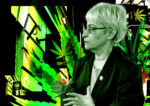In late April, the city padlocked an unlicensed cannabis seller in Jackson Heights. The store briefly re-opened, sparking protests from the community — and a second padlock in May.
The property manager, Judson Ain, then was told by the Queens district attorney that the owner would be fined $50,000 unless it evicted the shop. Ain got the tenant to surrender the lease, avoiding lengthy court proceedings.
Yet the space, on a busy retail corridor, remains empty. Ain can’t get the city to remove the lock.
“We acted within 24 hours of getting that notice,” he said. “And now we are waiting two weeks to get possession.”
Meanwhile, he’s getting complaints from the community about loitering, trash piling up and the eyesore of a dead storefront.
“The city acts beautifully when they lock you up,” said the property manager, “but when we do the right things as the landlord, they don’t act as quickly.”
It is hard to miss the smoke shops that have metastasized across New York City. Soon, however, their colorful signage will be replaced by brokers’ placards reading “For Lease.”
City and state officials have padlocked more than 400 unlicensed cannabis retailers since the beginning of May, a dramatic crackdown following the false start of threatened $10,000 fines, which landlords largely ignored.
The shutdowns have put property owners in a bind. They now must slog through the city bureaucracy to evict tenants, some of whom have returned their leases and left a padlocked, inaccessible store.
Lows and highs
In 2020, Covid lockdowns left a rash of retail vacancies. But the next year, just in time for landlords, the state legalized recreational cannabis use, unleashing a flood of cash-rich tenants: smoke shops.
New York attempted to set up a state-authorized cannabis industry, but the rollout left legitimate applicants waiting eons for licenses. Meanwhile, unlicensed shops sprouted like, well, weeds.
They’ll send a term sheet and say they’re a deli or bodega, then all of a sudden they’re open and they’re selling weed.
Jeffrey Hoffman, an attorney who works with licensed cannabis businesses, said the majority of landlords that rented to unlicensed ones either didn’t know or didn’t care if their tenants flouted the rules, and the threat of fines had no effect.
“I don’t know what planet we live on when landlords just take no responsibility for whoever they lease their property to or what happens there after they lease it,” Hoffman said. “That is where we are.”
But Brandon Singer, founder and CEO of Retail by MONA, said plenty of tenants lied to get leases.
“Some have not been honest with their landlord about what it is that they’re looking to do,” Singer said. “They’ll send a term sheet and say that they’re a deli or bodega, and then all of a sudden they’re open and they’re selling weed.”
By early this year, about 2,900 stores were selling cannabis without a license.
Fearful of re-starting the war on drugs, and hamstrung by state regulations, city officials appeared helpless. Eventually, the City Council resolved to go after landlords, passing a bill last year that authorized $10,000 fines for renting to unlicensed pot shops.
It had little apparent effect, and no wonder. The average asking rent along retail corridors in Manhattan was $688 per square foot, according to CBRE. For a 750-square foot store, that’s $43,000.
The tides turned in April, however, when Gov. Kathy Hochul and the state legislature put language in the state budget allowing local authorities to permanently close stores. A joint city task force in May began raiding unlicensed cannabis retailers, padlocking them and sticking orange court summonses on doors.
The state also gave landlords more power to evict. They now must only show that a tenant is “customarily or habitually” instead of “solely or primarily” selling cannabis illegally.
The legislation also threatens $50,000 fines for landlords who were notified that their tenants are operating illegal businesses and have not begun eviction proceedings.
This time, the effort produced results. Eviction filings in May and June show landlords across the five boroughs taking action.
Smoke shops “look like the bad guys”
Many property managers rented space to smoke shops years ago, assuming they would soon be licensed. This was a fair assumption at the outset of legalization, but the state moved like molasses.
Eventually, in October 2023, its Office of Cannabis Management opened an application window for general licenses, giving priority review to applicants who’d already secured a lease or a deed for a location. Today, many applications remain unprocessed, according to David Holland, attorney and partner at Prince Lobel Tye.
As Ain sees it, the smoke shops have gotten a bad rap.
“The public needs to understand that these tenants were under the pretense that they could open up and a legal license would be issued,” he said. “But then they changed the rollout, and now these guys look like the bad guys. So I feel for them.”
Ain operates a separately owned property on Lefferts Boulevard that was padlocked in May, but it was among the few stores that persuaded a court to remove the lock. The tenant is now reconfiguring the business to operate legally, according to Ain.
“In my eyes, they’ve done everything they’re supposed to do by reimbursing us [for legal fees] and paying the rent,” he said. “So I have no issue with them.”
However, tales of bureaucracy abound. The landlords of a much-maligned Brooklyn Heights smoke shop were glad when it was padlocked in early May, but have been frustrated in their efforts to evict it.
The tenant initially claimed to be a candy retailer, said Will Radmin, who manages the family-owned property. Over the years the shop has undergone several cannabis-related raids and, according to court filings from one eviction attempt, fell behind on rent.
Earlier this year, after another raid, Radmin got a call warning him of fines if he did not evict. So he again began the months-long process of filing, notifying the tenant and getting a hearing date. Radmin said he and his attorneys made several calls to the sheriff’s office to get to court faster, with no response.
Before he could get an index number for the case, the doors were padlocked again.
“We’re ready to move on,” Radmin said.
Additional reporting by Elisa Muyl
Pot-shop pitfalls
Beyond government actions, other liabilities weigh on landlords. Many mortgage covenants forbid renting to illegal businesses, which could prompt a lender to declare the loan in default. Also, landlords can be exposed if an unlicensed tenant’s product causes harm — say, to a minor, noted Alexander Malyshev, a partner at Carter Ledyard & Milburn. A number of unlicensed shops are near schools.
Landlords may even be criminally liable for knowingly renting to an unlicensed cannabis shop. New York’s Marijuana Regulation and Taxation Act, which in 2021 allowed recreational use of cannabis, does not supersede federal law, under which cannabis remains illegal.
“It’s everything from aiding and abetting to possibly money laundering,” said Malyshev. “I don’t know how they’re going about declaring the income they’re getting from this illegal cannabis, because banks are very [wary] of touching this.”
The good news for the city’s retail landlords, Singer said, is that the market is stronger than it was during the initial wave of unlicensed businesses. Only 15.4 percent of retail space was available in the first quarter of 2024. Singer said a healthier market will yield higher quality businesses and more discerning landlords.
“I think the next time around, a lot of landlords will be smarter about their decisions … because the retail market [will be] super healthy,” Singer said. “Landlords have the ability to pick what type of tenants they want.”
— Elisa Muyl and Emily Davis
Read more



